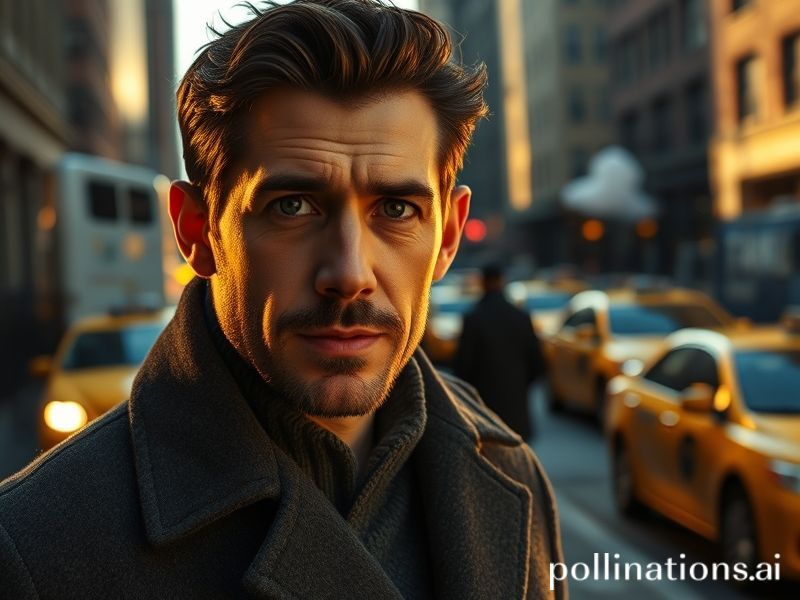Jake Gyllenhaal: The Last American Export That Isn’t Weaponized (Yet)
**Jake Gyllenhaal: The Last American Export That Isn’t Weaponized**
From the cafés of Buenos Aires to the karaoke bars of Seoul, the planet has quietly agreed on at least one thing: Jake Gyllenhaal is still handsome in 37 languages. While the United States struggles to sell democracy, soybeans, or even a coherent foreign policy these days, its most reliable soft-power asset remains a 43-year-old man whose eyes look like they’ve read Kierkegaard but still remember your Wi-Fi password. Call it the Gyllenhaal Doctrine: when bombs fail, cheekbones prevail.
Let’s zoom out. In a world where streaming algorithms treat borders like drunk tourists treat velvet ropes, Gyllenhaal’s face is a kind of supranational currency. Netflix, still the UN of binge-watching, recently reported that *Road House*—his 2024 remake of the Patrick Swayze elbow-fest—was watched for 50 million hours globally. That’s 5,700 calendar years, or roughly the shelf life of a Russian election promise. More importantly, it means a bar owner in Lagos and an insomniac in Reykjavik both spent Friday night watching the same American muscle whisper homoerotic threats to a shirtless Conor McGregor. Cultural imperialism never looked so moisturized.
But the Gyllenhaal phenomenon isn’t just about thirst-trap diplomacy. It’s about timing. The man debuted in the late ’90s, when the U.S. still exported optimism instead of inflation. Since then, he’s surfed every zeitgeist wave: post-9/11 paranoia (*Jarhead*), post-recession malaise (*Nightcrawler*), post-truth neurosis (*Velvet Buzzsaw*), and now post-post-whatever (*Road House*). If nations had LinkedIn profiles, America’s would read: “Former hegemon, current content farm. Endorsed by Jake Gyllenhaal for ‘Pretending Everything’s Fine.’”
Meanwhile, the rest of the planet has learned to weaponize him. South Korean marketing executives dub his voice with the gravitas of a funeral DJ, boosting ticket sales for art-house flops. French critics, who normally treat Hollywood like a communicable disease, hail him as “le nouveau Montgomery Clift avec des traps,” which roughly translates to “pretty but can probably deadlift your dissertation.” Even the Chinese censors—who once digitally erased entire plotlines for being too sexually confusing—allowed *Spider-Man: Far From Home* to keep Gyllenhaal’s Mysterio intact, presumably because hallucinatory villains are now considered state policy.
Of course, every empire has its tariffs. Gyllenhaal’s global appeal comes packaged with the usual American contradictions. He’s the indie darling who still does Disney. The Method actor who once wore a papier-mâché bubble head to promote *Bubble Boy*. The environmental advocate who flies private to climate summits, emitting more carbon than a small Balkan nation. International audiences notice these things, then shrug and stream *Prisoners* anyway—because at 2 a.m., moral coherence is less comforting than a man who can cry on cue.
There’s also the darker subplot: Gyllenhaal as the last leading man before AI replaces charisma with code. Hollywood’s current panic—writers on strike, actors fearing deepfake doppelgängers—casts him as a kind of analog Atlantis: a place we’ll tell our kids existed once, before the machines learned to smirk. Already, Russian Telegram channels circulate doctored videos of “Gyllenhaal” endorsing cryptocurrency schemes. The real Jake, meanwhile, is probably doing goat yoga in Ojai, blissfully unaware that his face is being used to launder oligarch money faster than you can say *Donnie Darko*.
So what does it all mean? In an era when nations weaponize everything from microchips to memes, Gyllenhaal remains the rare export that no customs officer can quite classify. Not quite propaganda, not quite art, but undeniably useful—like a Swiss Army knife that happens to have abs. The world will keep arguing about tariffs, vaccines, and whether pineapple belongs on pizza. But somewhere tonight, a teenager in Jakarta is pausing *Nightcrawler* at minute 47, mesmerized by the sociopathic twinkle in those all-American eyes, and thinking, “Screw politics—I’d follow this man into traffic.”
Which, in 2024, might be the closest thing we have to diplomacy.







